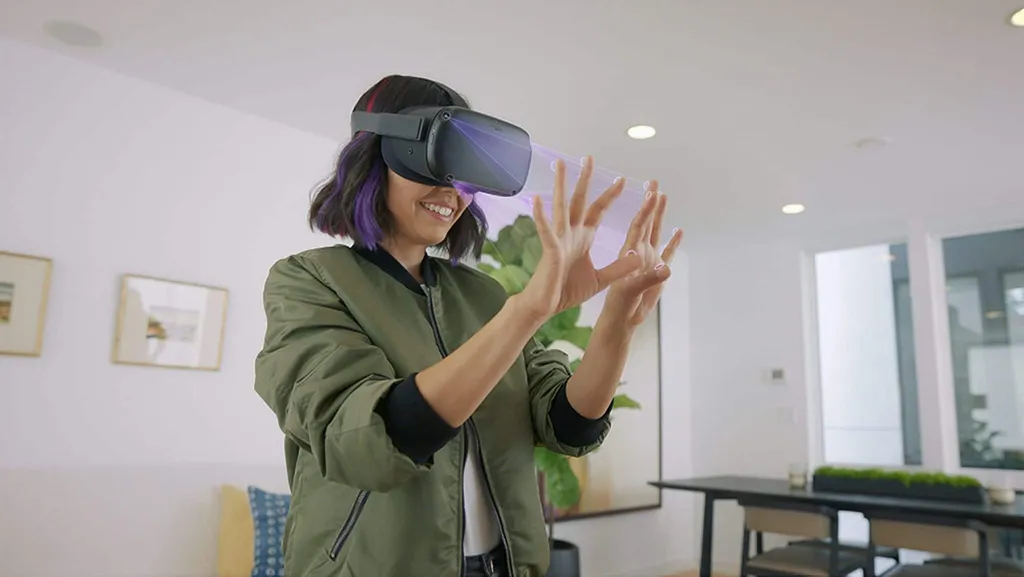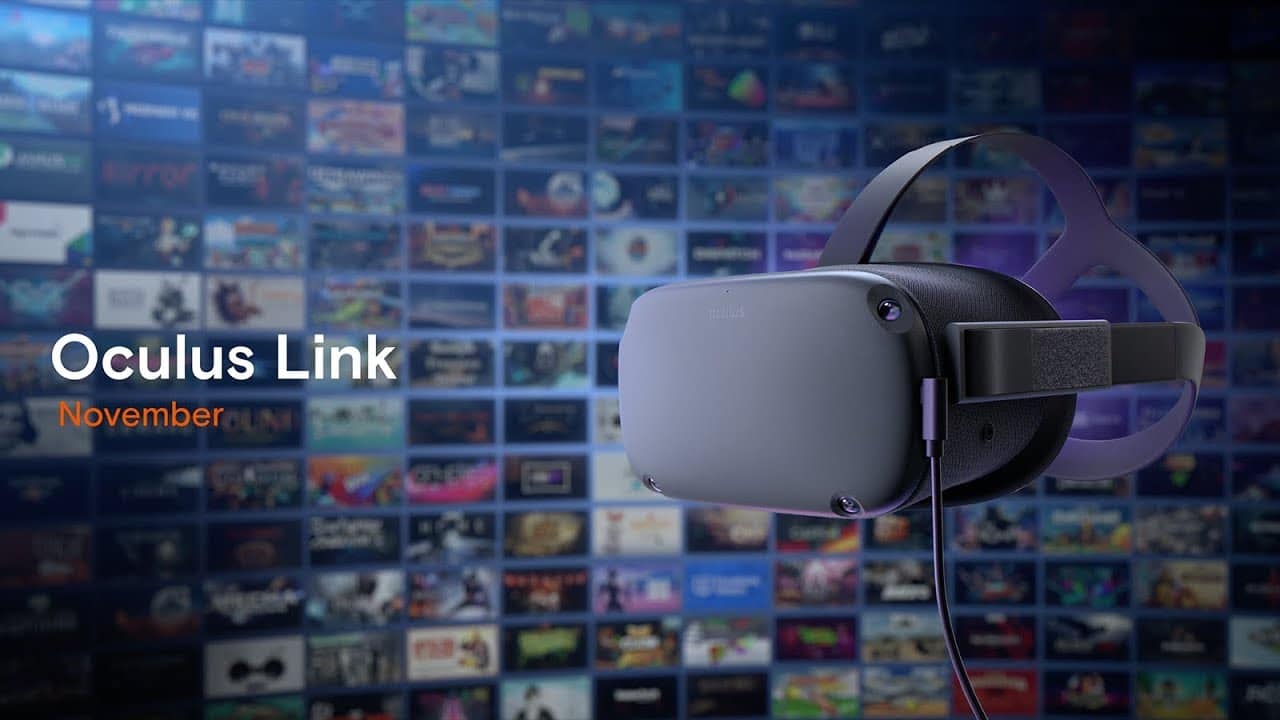The Oculus Link beta and forthcoming support for hand-tracking are poised to completely change the VR market.
Facebook’s all-in-one VR headset, Oculus Quest, went on sale in May 2019 for $400 and it is safe to say now, in November, it owned the standalone VR category by itself this year. There’s simply no other device I could recommend people put on their heads with the same ease of setup and roster of games including incredible genre-defining titles like Beat Saber, Pistol Whip, and Superhot.
Some people, sure, could seek a holiday sale and upgrade their PlayStation 4 with a PSVR to access a vast library of great games for a reasonable price — becoming one of the millions of PSVR owners out there. Some folks could even invest in the multi-thousand dollar purchase that is the super comfortable Valve Index combined with a high-powered PC to run physics-heavy games like H3VR or Boneworks in the best possible conditions.
But for first time VR buyers how could I recommend anything but Oculus Quest?
Facebook is securing almost every VR title for the system by either making it alluring enough to port the title directly, or through the wired Oculus Link beta connection launching soon. If you want to try becoming a wireless engineer to squeeze every millisecond of latency out of your local network you could even try wireless SteamVR content like No Man’s Sky VR through a SideQuest-patched version of Guy Godin’s Virtual Desktop app on Quest. We wouldn’t recommend that route, of course — there are actual wireless engineers trying to improve how this type of connection works and make it more comfortable — but wireless SteamVR content is still there for a vocal minority of people who want that kind of access to their PC VR content library.
Perhaps most important is that Facebook continues to show a willingness to constantly update, expand and reinvest in Quest’s capabilities and software library where some competitors — I’m looking at you Google and Microsoft — let their initial VR platforms languish.
Valve And SteamVR
Over the next few months Facebook’s standalone Quest VR system — already room-scale with controller tracking — will gain two modes that completely change the value proposition for the all-in-one VR headset.
Oculus Link will bring over PC VR games while hand tracking can enable operation of the headset without any controllers — a feature that should make the system more accessible more often to a broader group of buyers. Next year, you could probably watch movies on a Quest, for instance, using your fingers in the open air to adjust volume and playback functions.
While Microsoft’s Mixed Reality headsets might see steep discounts over the next few months — as they have in the past — the biggest unknown of 2019 for practically anyone interested in a VR headset is one very simple question:
Does Oculus Quest run Valve’s VR game?
“Valve Flagship VR Game / Later This Year,” it said on the slide in Valve’s April presentation revealing the company’s own Index VR headset and controllers. “Play it on any SteamVR compatible system.”
We’ve contacted Valve representatives multiple times seeking an update on the game, but the only one we’ve noted over the last six months is a presentation by one of the game’s developers talking about VR door design.
It is in the best interests of a lot of people to make sure Quest works well with Valve’s VR game over the Oculus Link. But the thing about VR is that “works” and “works well” are completely different standards. “Works” can result in a splitting headache after 20 minutes while “works well” can mean a completely transcendent and fully transportive experience. Consider in that context that, as of this writing in mid-November 2019, the likelihood nobody has played Valve’s VR game on the Oculus Quest over the Oculus Link wired Beta connection.
There just aren’t that many teams worldwide making VR games of the scale and scope that VR buyers want. This makes the results of Valve’s VR game design work since 2016‘s The Lab of incredible interest to anyone with a VR Ready PC. There is value in visually stunning PC power with complex physical simulation and powerful haptics, and Valve’s VR game design work could stand as a marker showing what level of immersion Intel, AMD and NVIDIA chipsets are uniquely equipped to create for VR buyers through a PC in 2019.
Facebook told us developers may be able to opt out of support for the Oculus Link Beta — though we don’t know precisely how that will work just yet.
Closing out the 2010s
So we’re starting to prepare our VR shopping recommendations for Black Friday 2019 as well as downloading software to show our families over the coming holiday visits, and preparing speeches to give explaining what the right choice is to make if you’re interested in getting a VR headset this year.
So with the Valve-Quest connection an unknown, if I had to sum it all up right now I’d say Microsoft and Sony’s VR efforts are showing their age ahead of a new generation of game consoles which launch starting in late 2020. HTC’s moddable Cosmos is expensive, relies on battery-hungry controllers and there have been complaints about the tracking quality, though it is getting updates.
Facebook and Valve launched significant and high quality new VR products in 2019 pushing forward immersion in vastly different ways — Valve through five finger tracking and unmatched visual comfort on the wired Index paired with strong haptics on its new controllers, and Facebook through untethered standalone freedom on the Quest paired with Touch controllers.
Unless you already have a PS4 or a couple thousand dollars to invest in a VR Ready PC and Valve’s SteamVR Tracking system with Index, Oculus Quest is looking like it is going to be the main hardware I recommend this holiday season.
Of course I’m going to tell people that Index is the only headset I can use where I don’t feel any discomfort at all after taking it off, no matter the length of my play session. Also, PSVR’s install base is around 5 million by now and it arguably “won” VR’s first generation. But I also have to point to Quest’s easy setup, room-scale tracking, wireless freedom and Touch’s analog sticks as a more refined experience out of the box — all features shipping now before Quest gets hand tracking and the Oculus Link beta.
Last month Jamie Feltham wrote an editorial about the long road ahead for PSVR fans waiting for PSVR 2 and — unless there are more big plans for PSVR beyond Iron Man in February — come 2020 the differences between Quest and PSVR will only become clearer and more profound. With Apple reportedly targeting 2022 for a Quest-like headset and no indications we’ll see a PSVR 2 in 2020, the coast is clear for Facebook’s Quest to make significant progress building out a platform as the headset of choice for millions.






























